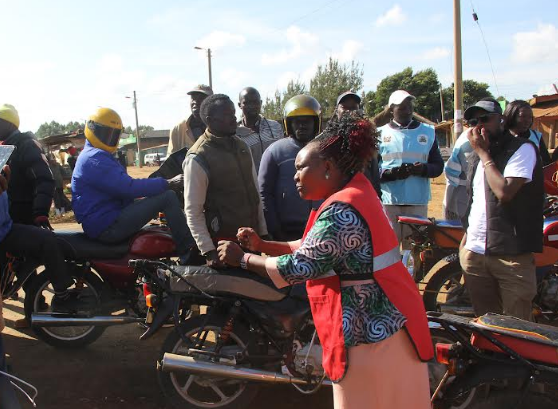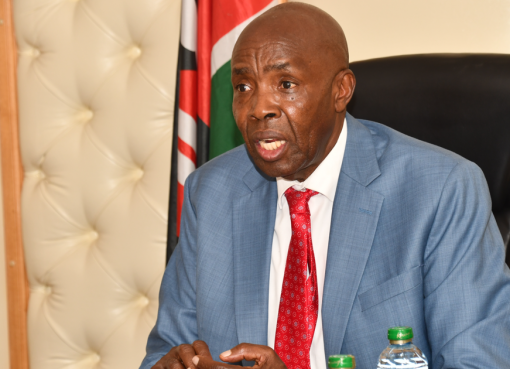Kenya Red Cross Society and partners conducted a public education campaign in Uasin Gishu emphasising adherence to seeking prescriptions from medical practitioners before buying drugs over the counter to combat the world’s silent pandemic of Anti-Microbial Resistance (AMR).
The sensitisation was part of World AMR Awareness Week 2024, a global campaign to raise awareness and understanding of Antimicrobial Resistance (AMR) and to promote best practices to reduce the emergence and spread of drug-resistant infections.
It was conducted across Kesses and Kapseret sub-counties in Uasin Gishu County, where residents were cautioned against misuse of antibiotics, sharing doses meant for one person, and administering medicine meant for human use to animals, such as Amoxil to treat chicken flu, among other malpractices.
A section of residents led by Dismas Kimtai from Ngeria confessed to abetting the abuse of antibiotics when he admitted that he cannot wait to see his friend becoming terribly sick, yet he has some drugs he is using and therefore shares some with him before the patient visits the hospital, a practice which is totally wrong as it causes drug resistance in the future.
“I worry about how toxic these drugs may have become in my body due to misuse for a long time,” lamented Sarah Maiyo.
Dr. Paul Olale, the Project Officer for AMR Stewardship in Uasin Gishu County, explained that antimicrobial resistance (AMR) occurs when bacteria, viruses, fungi, and parasites change over time and no longer respond to medicines, making infections harder to treat and increasing the risk of disease spread, severe illness, and death.
“As a result of drug resistance, antibiotics and other antimicrobial medicines become ineffective, and infections become increasingly difficult or impossible to treat.
Members of the public in the community are the primary targets of this global threat since they have no knowledge; there is a need to educate them in order to reduce threats posed by AMR,” he said.
He reiterated that the misuse and overuse of antimicrobials in humans, animals, and plants are the main drivers in the development of drug-resistant pathogens.
AMR affects countries in all regions and at all income levels. Its drivers and consequences are exacerbated by poverty and inequality, and low- and middle-income countries are most affected.
Kenya Red Cross Volunteer Sally Chebet, who spearheaded the sensitisation exercise at Ngeria Junction, Kipsimo, Ngonyit, Songoliet, Prison, and other villages in Kapseret and Kesses sub-counties, pointed out that many locals admitted not completing their prescribed antibiotic doses and at the same time repurposing them for other un-prescribed uses like treating chicken flu, among others.
This act not only endangers human health but also compromises the safety of food products consumed in the community, like chicken meat, since they will contain traces of the wrongly administered drugs, which in turn play a great role in contributing to drug resistance.
The KRCS AMR awareness team urged the members of the community to follow directives given by physicians in order to have their illnesses cured properly as compared to when they do not finish the prescribed doses.
They further emphasized the importance of completing prescribed doses to combat the growing threat of antimicrobial resistance.
Chebet acknowledged the challenges of educating the public on the silent pandemic, noting that it was an uphill task as she affirmed their commitment to reaching out to people in the communities up to the shopping centres to spread awareness.
According to the WHO, antimicrobial resistance (AMR) is estimated to be responsible for around 700,000 deaths per year. In 2019, bacterial AMR was directly responsible for 1.27 million deaths globally and contributed to 4.95 million deaths. It is feared that, unless checked, AMR could potentially cause 10 million deaths by 2050.
The statistics by the Institute for Health Metrics and Evaluation indicate that AMR represents a global challenge, and the burden of antimicrobial resistance (AMR) in Kenya revealed in 2019 that there were 8,500 deaths attributable to AMR and 37,300 deaths associated with AMR.
Additionally, Kenya has the 28th highest age-standardised mortality rate per 100,000 population associated with AMR across 204 countries.
The number of AMR deaths in Kenya is higher than deaths from neoplasms, enteric infections, maternal and neonatal disorders, digestive diseases, and diabetes and kidney diseases.
By Ekuwam Sylvester





